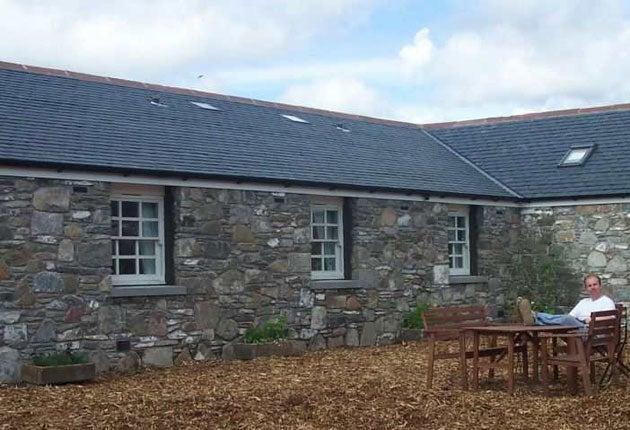Responsible tourism 2009: This year's motto must be watch your carbon footprint

Your support helps us to tell the story
From reproductive rights to climate change to Big Tech, The Independent is on the ground when the story is developing. Whether it's investigating the financials of Elon Musk's pro-Trump PAC or producing our latest documentary, 'The A Word', which shines a light on the American women fighting for reproductive rights, we know how important it is to parse out the facts from the messaging.
At such a critical moment in US history, we need reporters on the ground. Your donation allows us to keep sending journalists to speak to both sides of the story.
The Independent is trusted by Americans across the entire political spectrum. And unlike many other quality news outlets, we choose not to lock Americans out of our reporting and analysis with paywalls. We believe quality journalism should be available to everyone, paid for by those who can afford it.
Your support makes all the difference.The recession may be bad news for the more traditional holiday companies, but for travellers looking to make their breaks a deeper shade of green, the financial crisis offers one more reason to opt for more responsible trips.
Holidaying closer to home and exchanging impulse city breaks by plane for longer annual trips may be prompted more by budgetary reasons than ethical ones in 2009. Still, the planet will reap the rewards.
If a UK holiday is on the cards for you, cult website Ecoescape ( www.ecoescape.org), which focuses on eco-friendly holidays in the UK and Ireland, is launching a series of "ecoescape tours", inspired by its books on Scotland, Ireland and Wales. Run in association with its member tour operators, these will cover outdoor, environmental and cultural itineraries, from wildlife watching to foraging.
Or rent an eco cottage. One new property worth checking out is Orchard Cottage in Wigtownshire, Scotland. The sensitively converted barn sleeps six in eco-conscious style, with a wood-fired underfloor heating system, solar panels, sun tunnels, cork and bamboo flooring, green paints and – from next summer – a grey-water system. Rental starts at £250 a week ( www.ravenstonecottages.co.uk ).
Dedicated urbanites need not miss out, though. Bristol ( www.visitbristol.co.uk) is set for a boom in responsible city breakers, having just been shortlisted as the first European Green Capital ( www.tinyurl.com/egcapital). It has proportionally more open spaces than other UK cities; many hotels and B&Bs committed to the Green Tourism Business Scheme (green-business.co.uk); great local farmers' markets; it occupies pole position as the UK's first official Cycling City; and Bristol is also home turf of both the Soil Association and Sustrans, there's plenty to attract green-minded visitors.
But being a responsible traveller doesn't mean you have to holiday in the UK. Active travellers looking for a green sunshine break might want to consider a new low-impact sea-kayaking trip to Sardinia with sustainable adventure tour operator Wilderness Journeys ( www.wildernessjourneys.com). Launching early next summer, the one-week breaks start at £975 per person, including accommodation, most meals, equipment and guiding. To get there by train and ferry, go to seat61.com for help with planning routes.
Also reachable overland is Switzerland; the Switzerland Travel Centre ( www.stc.co.uk) is launching new cycling holidays next year using electric bikes to explore the landscape around Lake Thun in the Bernese Oberland. Though the bike's not as sustainable as the muscle-powered version, if you're looking for speed, extra power on uphill stretches or to cover a lot of terrain in a day, the "Flyer" bikes are a more ethical alternative to conventional motorised transport. Starting in June, these seven-night holidays involve about 27 miles of cycling per day and cost from £939 per person, including international train travel from the UK, accommodation, most meals, route maps, baggage transfer and Flyer hire.
For further inspiration, several new travel books are due out next year with a responsible slant. Green Europe (Special Places to Stay) by Kate Shepherd (Alastair Sawday, £11.99) is published in May, offering a rundown on European accommodation with serious ethical credentials, as well as information on what each country is doing to go green and how to get there the low-carbon way. Bradt's new guide to voluntourism, Wildlife and Conservation Volunteering: The Complete Guide (£13.99), is outnext month, and Lonely Planet's A Year of Wildlife Watching (£14.99) is due in August.
Websites remain a useful way to get access to fast-changing information. Recent launches include www.iknowagreatplace.com and www.leaplocal.org, both of which stress the social aspect of responsible travel, as well as the environmental. Also worth logging on to is www.greentravelguides.tv, a new site that offers podcasts on destinations, hotels and tour and transport operators that are making serious efforts to cut environmental impact.
Finally, if you want to find out more about how green issues affect communities on the ground, the Festival of the Niger ( www.festivalsegou.org) takes place in Ségou, in Mali, from 28 January to 1 February. The focus is on art, music and film but the theme of this year's event is "local knowledge and the environment". Truly committed responsible travellers will be going overland, of course.
John Stewart, Environmentalist
"Responsible travel is important because if we travel irresponsibly it can lead to climate change and unacceptable levels of noise and air pollution for local communities. My most exotic trip was two years ago when I combined a holiday with a conference in Istanbul. I pride myself on having gone there and back by train. I have few travel plans for 2009, but I'm 100 per cent certain that I won't be flying anywhere."
John Stewart is chair of the Campaign for Better Transport ( www.bettertransport. org.uk)
Join our commenting forum
Join thought-provoking conversations, follow other Independent readers and see their replies
Comments